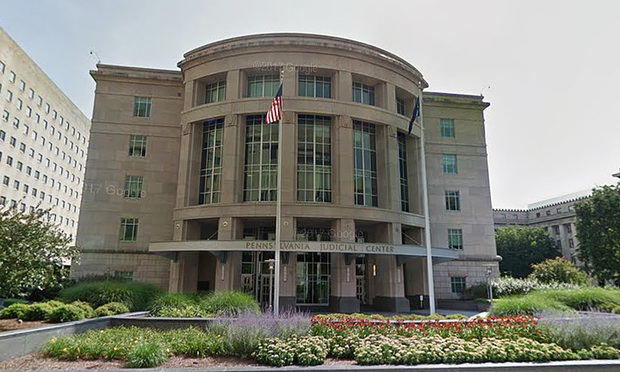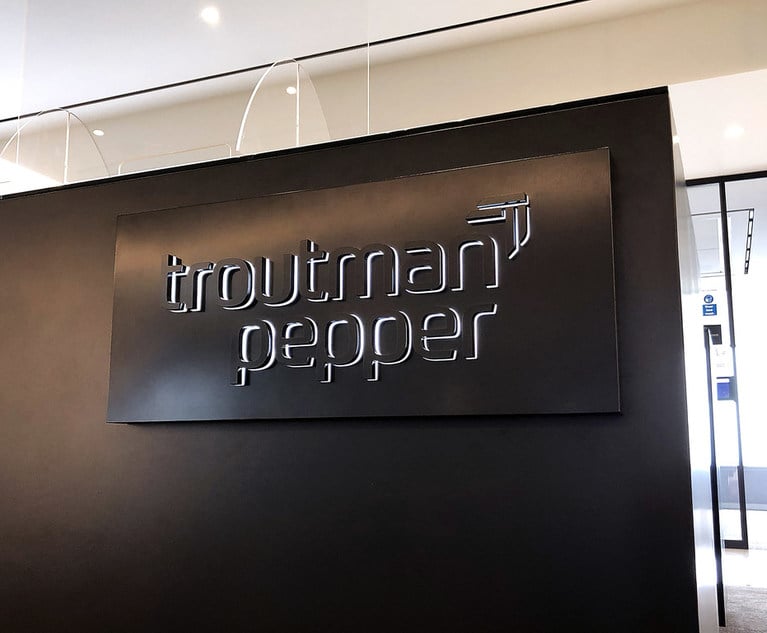PBA Rates Phila. Judge as 'Highly Recommended' for Superior Court in Last Batch of Evaluations
The newly rated contenders come in addition to the five that the bar association rated in January, all of whom are vying for two open spots on the intermediate appellate court.
March 11, 2019 at 03:05 PM
3 minute read
 Superior Court of Pennsylvania, 601 Commonwealth Ave #1600, Harrisburg. Photo: Google
Superior Court of Pennsylvania, 601 Commonwealth Ave #1600, Harrisburg. Photo: Google
In its final round of ratings for potential Superior Court candidates, the Pennsylvania Bar Association has issued ratings of three additional contenders, with one receiving a “highly recommended” rating and two receiving ratings of “not recommended.”
The three hopefuls include a Philadelphia judge who before her election to the Common Pleas Court served as chief counsel to Sen. Anthony Williams, D-Philadelphia, and a Pittsburgh attorney who caused concern at the bar association's Judicial Evaluation Commission over her handling of social media content that was allegedly plagiarized.
The newly rated contenders come in addition to the five that the bar association rated in January, all of whom are vying for two open spots on the intermediate appellate court.
The only candidate to receive a “highly recommended” rating in the latest round was Philadelphia Judge Timika R. Lane.
Lane has presided over criminal cases after she was elected to the Philadelphia Court of Common Pleas in 2013. Before taking the bench, she worked in private practice handling family law cases, and later handled major trials at the Defender Association of Philadelphia. In 2009, she became chief counsel to Williams.
In its release explaining the ratings, the commission said Lane's colleagues describe her as “fair, even handed, highly ethical, hardworking and knowledgeable.”
“She demonstrates a commitment to public service and has extensive community involvement,” the commission said. “Due to her background, attributes and experience, the commission is confident the candidate would serve with distinction as a Superior Court judge.”
The rating makes Lane and fellow Philadelphia Judge Daniel McCaffery as the only two candidates to receive “highly recommended” ratings.
Pittsburgh attorney Elizabeth Tarasi, who focuses on personal injury and real estate, was rated as “not recommended” over concerns stemming from alleged plagiarism.
According to the commission, Tarasi had the “requisite legal knowledge, ability and writing skills” needed to become a Superior Court judge, and her record of community involvement also showed she had “the appropriate temperament and character for the judiciary.” However, the commission said it had concerns about her social media content.
“During her interview with the commission, it was revealed that she failed to exercise oversight of plagiarized content on her social media website,” the commission said. “When questioned, she failed to accept full accountability for the matter, leaving the commission with concerns about her character and integrity.”
As a result the commission rated her as “not recommended.”
Tarasi did not immediately return a call seeking comment.
McKeesport attorney Ryan James also received a “not recommended” rating by the commission.
According to the commission, James has been practicing since 2012, and, after working as an associate for three months, he opened his own firm as a solo practitioner with a general practice. The commission noted James has never held a judicial clerkship.
“Although known for his good temperament and diligent work ethic, the commission finds the candidate has not had the breadth or depth of experience necessary to take on the role of the Pennsylvania Superior Court,” the commission said.
Along with McCaffery, the three newly rated contenders join candidates Catherine “Kate” Harper, Megan Lee King and Cumberland County Judge Christylee Peck, who each received a “recommended” rating, as well as Amanda Green-Hawkins, who received a “not recommended” rating.
James did not immediately return a call seeking comment.
This content has been archived. It is available through our partners, LexisNexis® and Bloomberg Law.
To view this content, please continue to their sites.
Not a Lexis Subscriber?
Subscribe Now
Not a Bloomberg Law Subscriber?
Subscribe Now
NOT FOR REPRINT
© 2025 ALM Global, LLC, All Rights Reserved. Request academic re-use from www.copyright.com. All other uses, submit a request to [email protected]. For more information visit Asset & Logo Licensing.
You Might Like
View All

Troutman Pepper Says Ex-Associate Who Alleged Racial Discrimination Lost Job Because of Failure to Improve
6 minute read
Over 700 Residents Near 2023 Derailment Sue Norfolk for More Damages
3 minute readTrending Stories
- 1Six Benefits of Taking an Opposing Medical Expert’s Deposition
- 2Ex-Prosecutor’s Trial Ends as Judge Throws Out Her Felony Indictment in Ahmaud Arbery Death Case
- 3Conversation Catalyst: Transforming Professional Advancement Through Strategic Dialogue
- 4Trump Taps McKinsey CLO Pierre Gentin for Commerce Department GC
- 5Critical Mass With Law.com's Amanda Bronstad: 700+ Residents Near Ohio Derailment File New Suit, Is the FAA to Blame for Last Month's Air Disasters?
Who Got The Work
J. Brugh Lower of Gibbons has entered an appearance for industrial equipment supplier Devco Corporation in a pending trademark infringement lawsuit. The suit, accusing the defendant of selling knock-off Graco products, was filed Dec. 18 in New Jersey District Court by Rivkin Radler on behalf of Graco Inc. and Graco Minnesota. The case, assigned to U.S. District Judge Zahid N. Quraishi, is 3:24-cv-11294, Graco Inc. et al v. Devco Corporation.
Who Got The Work
Rebecca Maller-Stein and Kent A. Yalowitz of Arnold & Porter Kaye Scholer have entered their appearances for Hanaco Venture Capital and its executives, Lior Prosor and David Frankel, in a pending securities lawsuit. The action, filed on Dec. 24 in New York Southern District Court by Zell, Aron & Co. on behalf of Goldeneye Advisors, accuses the defendants of negligently and fraudulently managing the plaintiff's $1 million investment. The case, assigned to U.S. District Judge Vernon S. Broderick, is 1:24-cv-09918, Goldeneye Advisors, LLC v. Hanaco Venture Capital, Ltd. et al.
Who Got The Work
Attorneys from A&O Shearman has stepped in as defense counsel for Toronto-Dominion Bank and other defendants in a pending securities class action. The suit, filed Dec. 11 in New York Southern District Court by Bleichmar Fonti & Auld, accuses the defendants of concealing the bank's 'pervasive' deficiencies in regards to its compliance with the Bank Secrecy Act and the quality of its anti-money laundering controls. The case, assigned to U.S. District Judge Arun Subramanian, is 1:24-cv-09445, Gonzalez v. The Toronto-Dominion Bank et al.
Who Got The Work
Crown Castle International, a Pennsylvania company providing shared communications infrastructure, has turned to Luke D. Wolf of Gordon Rees Scully Mansukhani to fend off a pending breach-of-contract lawsuit. The court action, filed Nov. 25 in Michigan Eastern District Court by Hooper Hathaway PC on behalf of The Town Residences LLC, accuses Crown Castle of failing to transfer approximately $30,000 in utility payments from T-Mobile in breach of a roof-top lease and assignment agreement. The case, assigned to U.S. District Judge Susan K. Declercq, is 2:24-cv-13131, The Town Residences LLC v. T-Mobile US, Inc. et al.
Who Got The Work
Wilfred P. Coronato and Daniel M. Schwartz of McCarter & English have stepped in as defense counsel to Electrolux Home Products Inc. in a pending product liability lawsuit. The court action, filed Nov. 26 in New York Eastern District Court by Poulos Lopiccolo PC and Nagel Rice LLP on behalf of David Stern, alleges that the defendant's refrigerators’ drawers and shelving repeatedly break and fall apart within months after purchase. The case, assigned to U.S. District Judge Joan M. Azrack, is 2:24-cv-08204, Stern v. Electrolux Home Products, Inc.
Featured Firms
Law Offices of Gary Martin Hays & Associates, P.C.
(470) 294-1674
Law Offices of Mark E. Salomone
(857) 444-6468
Smith & Hassler
(713) 739-1250






